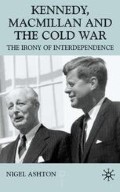Abstract
Looming larger than events in the Congo, a key component of the crisis of interdependence that came together in the winter of 1962–3 was the failure of the British application to join the EEC. In Harold Macmillan’s mind, this application had been conceived in the wake of the collapse of the Paris summit of May 1960 as a means to maintain Britain’s international economic and political position in the face of the unreliability of the Anglo-American alliance. As such it was an exercise in the hedging of bets. That Macmillan should have chosen the EEC course by 1961, when one looks back to the beginning of his premiership, is somewhat surprising. In fact, in his early years as prime minister, Macmillan proved to be at best a reluctant European. Coming to office in the aftermath of the Suez crisis, it is arguable that he might have chosen a European rather than an Anglo-American path for Britain in foreign affairs. After all, one reading of the Suez crisis was that ‘European’ cooperation in the shape of the Anglo-French collusion with the Israelis had provided the only means by which Britain could defend her position in the face of American unreliability.
Access this chapter
Tax calculation will be finalised at checkout
Purchases are for personal use only
Preview
Unable to display preview. Download preview PDF.
Notes
Quoted in Young, J. W., Britain and European Unity, 1945–1992 ( Basingstoke: Macmillan — now Palgrave Macmillan, 1993 ), p. 52.
See also Ellison, J., Threatening Europe: Britain and the Creation of the European Community, 1955–58 ( Basingstoke: Macmillan–now Palgrave Macmillan, 2000 ), pp. 97–103.
Moravcsik, A., The Choice For Europe: Social Purpose and State Power From Messina to Maastricht ( Ithaca: Cornell University Press, 1998 ), pp. 128–9.
Ludlow, N. P., Dealing with Britain: The Six and the First UK Application to the EEC ( Cambridge: CUP, 1997 ), p. 26.
Griffiths, R. T., ‘A slow one hundred and eighty degree turn: British policy towards the Common Market, 1955–60’, in Wilkes, G., Britain’s Failure to Enter the European Community, 1961–63: The Enlargement Negotiations and Crises in European, Atlantic and Commonwealth Relations ( London: Frank Cass, 1997 ), pp. 39–40.
De Gaulle, C., Mémoires de Guerre (Paris: 1959 ) quoted in Moravcsik, The Choice For Europe, p. 178.
Gordon, P. H., A Certain Idea of France: French Security Policy and the Gaullist Legacy ( Princeton: Princeton University Press, 1993 ), p. 8;
Newhouse, J., De Gaulle and the Anglo-Saxons ( London: André Deutsch, 1970 ), pp. 44–6.
Bange, O., The EEC Crisis of 1963: Kennedy, Macmillan de Gaulle and Adenauer in Conflict ( Basingstoke: Macmillan — now Palgrave Macmillan, 2000 ), p. 22; Gerbet, P., ‘The Fouchet negotiations for political union and the British application’, in Wilkes, Britain’s Failure to Enter the European Community, 1961–63, p. 135.
Home, A., Macmillan, 1894–1956 (London: Macmillan — now Palgrave Macmillan, 1988), pp. 167–8; 179–90.
Home, Macmillan, 1894–1956, p. 187. See also Charmley, J., ‘Harold Macmillan and the Making of the French Committee of Liberation’, The International History Review, Vol. IV, No. 4, 1982, pp. 565–6.
Macmillan, H., The Blast of War, 1939–1945 ( London: Macmillan–now Palgrave Macmillan, 1967 ), pp. 345–6.
Quoted in Charlton, M., The Price of Victory ( London: BBC, 1983 ), p. 237.
Tratt, J., The Macmillan Government and Europe: A Study in the Process of Policy Development ( Basingstoke: Macmillan — now Palgrave Macmillan, 1996 ), p. 191.
Kaiser, W., Using Europe, Abusing the Europeans: Britain and European Integration, 1945–63 ( Basingstoke: Macmillan — now Palgrave Macmillan, 1996 ), p. 108.
Winand, P., Eisenhower, Kennedy and the United States of Europe (Basingstoke: Macmillan — now Palgrave Macmillan, 1993 ), p. 144, 147. Ball was promoted in December 1961 to the rank of Under-Secretary of State.
Ball, G., The Past Has Another Pattern: Memoirs ( New York: W. W. Norton and Company, 1982 ), p. 74.
Dutton, D., ‘Anticipating Maastricht: The Conservative Party and Britain’s First Application to Join the European Community’, Contemporary Record, Vol. 7, No. 3, Winter 1993, p. 524.
Heath, E., The Course of My Life: My Autobiography ( London: Hodder and Stoughton, 1998 ), p. 211.
Ludlow, N., P, ‘Le Paradoxe Anglais: Britain and Political Union’, Revue d’Allemagne et des Pays de langue allemande, Vol. 29, No. 2, April–June 1997, pp. 259–60.
Record of a Conversation at the Chateau de Champs, at 5.50pm on Saturday 2 June 1962, PREM11/3775; Pagedas, C. A., Anglo-American Relations and the French Problem, 1960–1963: A Troubled Partnership ( London: Frank Cass Publishers, 2000 ), p. 209.
Author information
Authors and Affiliations
Copyright information
© 2002 Nigel Ashton
About this chapter
Cite this chapter
Ashton, N.J. (2002). The EEC Application. In: Kennedy, Macmillan and the Cold War. Contemporary History in Context. Palgrave Macmillan, London. https://doi.org/10.1057/9780230800014_7
Download citation
DOI: https://doi.org/10.1057/9780230800014_7
Publisher Name: Palgrave Macmillan, London
Print ISBN: 978-1-349-40346-2
Online ISBN: 978-0-230-80001-4
eBook Packages: Palgrave History CollectionHistory (R0)

